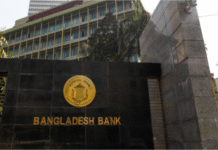
Bangladesh is advancing towards taking up the trade of refining gold in a bid to cater to the nearly $230 billion worth global gold jewellery market, meet domestic requirement and curb smuggling.
This month Bangladesh Bank allowed import of unrefined and partially refined gold revising a gold policy framed in 2018.
Moreover on July 7, the Ministry of Commerce issued a Standard Operating Procedure (SOP) for the establishment and running of gold refineries.
The ministry has given the initial nod for Bashundhara Group to establish a refinery investing Tk 5,600 crore, said a top official. Meanwhile, Diamond World has applied to set up another.
As per the SOP, businesses will need to submit copies of memorandums of understanding with one or more gold miners or suppliers of partially refined gold along with applications for getting primary approval from the commerce ministry.
Investors will have to submit structural layouts, list of machinery, origin and plans regarding effluent treatment, establishment of laboratory, warehouse and vault and the amount to be refined annually.
The SOP said interested companies would need a minimum capital of Tk 1,000 crore and paid-up capital of Tk 100 crore and own 20 bighas of unbroken stretch of land to run the operations on.
Additional Secretary to the commerce ministry AHM Shafiquzzaman said the initiative aims to cut import dependence for jewellers and curb smuggling.
“There is potential for export after meeting domestic demand,” he said.
He said the commerce ministry was prioritising investment capacities and security issue when allowing setting up of refineries.
Operators and officials said the latest government move would give fresh vigour and encourage creation of a gold refining industry, which would in turn meet demand among jewellers and create the scope for exporting jewellery.
Ganga Charan Malakar, chairman of Venus Jewellers, said consumers would benefit if prices reduce through local refining.
The revised gold policy seeks to make it easy to import and export the precious metal and establish transparency doing away with shady trade as there had been no formal import of gold because of various regulatory complexities.
Regarding local demand, the gold policy puts the annual figure between 20 tonnes to 40 tonnes.
Of it, only 10 per cent is met through resale of old jewellery.
Based on this, the commerce ministry said annual demand for new gold was 18 tonnes to 36 tonnes.
A majority of it is not legally imported.
In absence of formal imports, smuggled gold has found its way to feed the demand in the local market. And seizure of the metal by the customs authority testifies to this.
Customs seized 860 kilogrammes of gold in fiscal 2018-19, up from 605 kilogrammes the previous year, showed data by the National Board of Revenue.
A portion of the gold is also brought by passengers from abroad under the baggage rules framed by the customs authority.
Following the gold policy’s formulation, Bangladesh Bank issued import licences to 19 companies, including a commercial bank, since 2019 to encourage legal imports for people from all walks of life to meet their jewellery needs and enable security for rainy days.
“We have taken the initiative to cater to the domestic and international market for gold,” said Gazi Billal Hossain, head of division, secretariat of managing director of Bashundhara Group.
Bashundhara plans to establish the refinery in the city’s Kuril area. Around 8,000 people will be employed through the venture, said Hossain.
“We want to make world class gold in Bangladesh and improve the country’s image,” he said.
Dilip Kumar Agarwala, managing director of Diamond World, said the government decision was time befitting and a demand of the country.
He believes this industry would save foreign exchange and create employment.
Also general secretary of Bangladesh Jewellers Samity, Agarwala is optimistic about getting his permission from commerce ministry.
According to him, at least Tk 3,500 crore in investment was required to set up a refinery.


 For all latest news, follow The Daily Star’s Google News channel.
For all latest news, follow The Daily Star’s Google News channel. 







